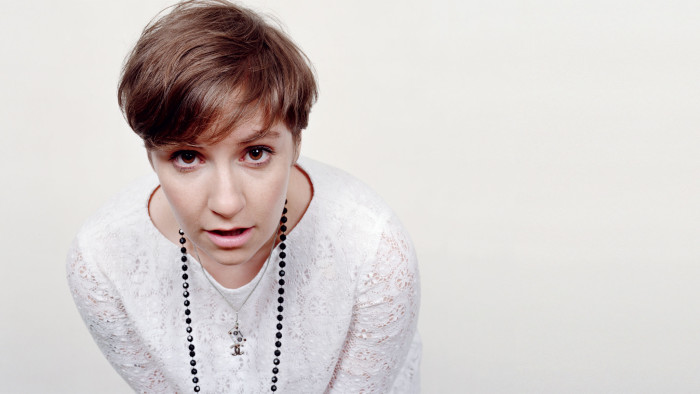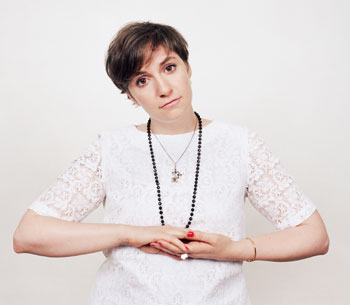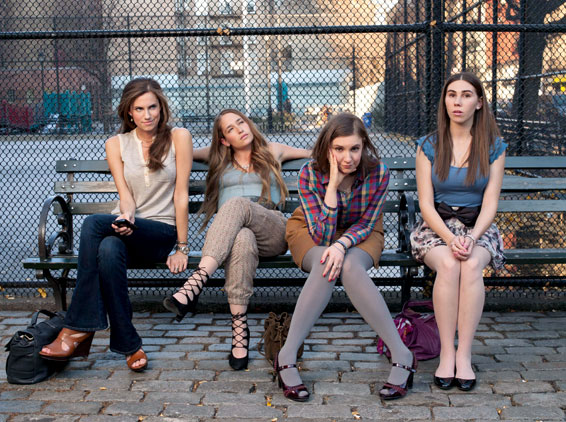Lena Dunham

Roula Khalaf, Editor of the FT, selects her favourite stories in this weekly newsletter.
With her hair cropped in a pixie-short cut, grey jeans and a navy blue blazer over a black T-shirt, Lena Dunham rushes through the door of the West Village coffee shop looking like any other over-scheduled, twenty-something New Yorker. The creative types sitting in the café barely look up from their coffee mugs and the glow of their computer screens.
Simultaneously apologising for rescheduling an earlier interview appointment, moving the location at the last minute and not bringing cash to a cash-only café, Dunham is carrying a paper shopping bag filled with giant jars of vitamins. Her father is worried that she’s overexerting herself and gave them to her, she explains.
He might be right. Following the April debut of her hit, Emmy-nominated HBO series Girls, now renewed for a second season, the 26-year-old writer, director and actor was catapulted from the fringes of the indie film world into the pop-culture spotlight. Dunham constantly tweets to her Twitter followers (now fast approaching 500,000), pens essays for The New Yorker and recently inked a book deal, reportedly valued at $3.5m, for a collection of “funny and frank advice” under the working title Not That Kind of Girl.
But between bites of organic cereal and berries, Dunham admits that the “Voice of a Generation” title that has become almost synonymous with her name is embarrassing. She wrote the line as a joke for the opening episode of Girls, when Dunham’s character, the 24-year-old Hannah Horvath, barges into her parents’ hotel room in an opium-induced haze and pushes a manuscript into their hands. “I think I may be the voice of my generation,” the aspiring writer proclaims. “Or at least a voice. Of a generation.”
The statement is a plea to her parents to continue funding her New York life, one that’s filled with cringe-inducing sex, humiliating underemployment, binge-eating, roommate spats and an unrelenting quest to become the woman that she is destined to be. Throughout the series, it’s questionable as to whether Hannah will ever find her own voice, let alone speak for others.
In contrast, her creator is wildly prolific and revered for chronicling the zeitgeist of the iPhone-wielding, Instagraming, tweeting generation. This autumn, Dunham starred in a controversial Obama campaign video. Glamour magazine recently named her a “Woman of the Year” – alongside gold-medal Olympians and US Supreme Court Justice Ruth Ginsburg. They called her, of course, “The Voice of a Generation”.
The notion isn’t, in fact, even relevant to her generation, she says. “It feels like an old-timey concept. It’s like a Beat Generation, Kerouac-y concept that’s not really applicable to what I am doing …Our generation is fat girls, gay men, transgender people, conservative people. I think my perspective is too specific to really be able to own that.” She pauses, her chipped black-and-white-nail-polished hand holding her spoon above her bowl. “But I do hope that there’s some feeling I’m capturing what it’s like to be young now,” she says.

Dunham grew up in New York and returned to live at her parents’ home after graduating in 2008 from Oberlin College, where she studied creative writing. She calls them her “best friends” and the “coolest people” she could find to live with. Her mother is a prominent photographer, her father a prominent painter. Although she moved out this summer, she never goes a day without talking with them or risks feeling “weepy”.
“This has been a crazy, preseason launch time,” Dunham says. She recently returned from a “so overwhelming” and “really hard to process” trip to India with her mother – her first vacation in years. “It’s not for the faint of heart and I’m vaguely faint of heart, but it was beautiful,” she says. “I’m very glad that I did it. Even though I sort of felt like I needed a vacation from my vacation upon my return.”
Now it’s the day before Thanksgiving, and Dunham – whose very public online display of emotion oscillates from angst-ridden to on-the-top-of-the-world – is grateful. “I’m so excited to meet you,” she says, stating that she loves the Financial Times before reflecting on the personal and cultural significance of her swift rise to celebrity. She’s earnest in person – a stark contrast to the irony permeating hipster life. Our conversation is briefly interrupted by a chance meeting with her best friend Isabel, whose boyfriend had proposed the previous night.
“Having a public life is a living, breathing thing,” Dunham continues. “It goes up, it goes down. There are moments people are more interested, there are moments when they’re not. I’m sure it’s something that I’ll always be working through and trying to stay cognitive of in some way.”
Last year, Dunham spent Thanksgiving with Nora Ephron, the American writer, producer and director who died this summer. Ephron, also described as a voice of her generation, had emailed Dunham to say that she enjoyed her 2010 independent film Tiny Furniture , about a young college graduate trying to figure out her goal in life. Ephron took Dunham to lunch then under her wing, forging a brief but invaluable relationship that Dunham says she will “refer to for ever”.
Such connections have propelled Dunham’s early career. Judd Apatow, the comedic mastermind behind The 40-Year-Old Virgin and Knocked Up, also sent Dunham an email after seeing Tiny Furniture. Dunham thought the note, praising the film and offering help building her career, was a prank from her friend Isabel. It wasn’t. The two met for a drink, and Apatow proceeded to take Girls to HBO and help produce the series.
“I was always really headstrong and wasn’t the mentor type. I was like, ‘I’m doing this on my own,’” Dunham says. “It was really when I met Judd that I felt like I began my first real mentor relationship. It was so powerful and just the feeling that somebody who’d been there before was clearing a little path in the brush for you.”
Lena on Lena

A year in the life of Lena Dunham through her tweets, Instagram photos and Facebook posts
This time last year, she suffered anxiety about how the first series of Girls would be received. “I already had a career that made me happy, and I felt so lucky. Each thing that’s happened has just been extra,” she says. “I keep thinking, I can’t believe that another ribbon has been tied around this box that already has 18 ribbons on it.”
Girls attracted attention even before its premiere, with young American women pining for a show that would capture their lives. When it began, chronicling the not-so-glamorous stories of four post-college white women in New York, nearly every episode sparked a flurry of praise and criticism.
Dunham unabashedly flaunts her naked body in the series, despite the fact that she’s not supermodel skinny. In one episode, the man she is sleeping with grabs her belly fat. She opened the Emmy Awards eating cake, naked, alone on a toilet – mimicking a scene in which she eats a cupcake in the bathtub.
In an era of Photoshopped Facebook profile pictures, the image Dunham presents of herself is shockingly raw. There isn’t much she hasn’t shared with the world. “We don’t yet know the long-term effects of living that way,” she says. “I have to believe that because it feels right that it’s going to be all right …I have to believe that because my creative instinct is to share the things I do, that it won’t come back to haunt me.” Is there anything people don’t know? “It’s hard to know what I haven’t shared because everything has come out in some incarnation. I don’t believe in secrets,” she says. “If something feels shameful my first instinct is to expose it.”
The graphic sex in the show isn’t that of Hollywood’s happy-ever-after endings. It’s rough. It’s casual. It has consequences: the girls deal with unwanted pregnancies and STDs. For Dunham these scenes are less a statement about what sex is and more a vehicle to discuss one girl’s journey towards selfhood through her relationships. “It’s a really good thermometer on how you think about yourself and what you think you deserve,” she says.

She understands the importance of complaints that the show lacks racial diversity: “I think television is a predominantly white, predominantly male industry, and that’s problematic because that’s supposed to be the people’s medium, and it’s not fulfilling its promise,” she says. In the first season, she wrote characters who were “incredibly close to me/parts of me.” For the second, she is trying to include a broader range of viewpoints. Ultimately Girls is about New York and needs to “accurately express what New York is, which is an incredible melting pot”.
“I hated the idea of making anybody feel isolated from the world of the show …as though they didn’t deserve to be on TV. I think a big thing was also we called the show Girls, and we made the voice-of-a-generation joke and as a result it, without my even meaning it to, took on this enormity,” she says.
Indeed, Dunham is breaking boundaries by forging a career in the traditionally male-dominated media industry. While she’s been lucky that HBO is a “progressive company”, she has found it a challenge more broadly to make middle-aged men understand why what she’s doing might be important. She recalls a similar frustration in seeking approval from a male principal in high school.
“I still don’t do well if there is some powerful guy who needs to be placated so that I can continue to do what I do. That just doesn’t fit into my conception of the world. It’s not the way that I was raised,” she says. “I’ve purposely avoided putting myself in subservient positions to overarching daddy figures.”
During the US election, Dunham used the platform she had developed through Girls to campaign for Obama. She frequently tweeted her support for his stance on women’s rights and gay marriage. One of her most popular tweets to date: “I want to same-sex marry Obama.” Dunham also made a divisive online video entitled “Your First Time”, which ranks as one of the Obama campaign’s most watched. “Your first time shouldn’t be with just anybody. You want to do it with a great guy,” she says in an appeal to first-time voters.
It unleashed a wave of excitement among young supporters, at the same time igniting fury from conservative groups. Dunham was shocked by the aggression in their response, as well as the criticism she received for sexualising the campaign. She was abroad when the video was released and her father rang to say that someone had called her a “whore” in response.
“That was disorienting,” she says. “It was actually evidence to me of how backwards so many rightwing Americans are about female sexuality …Debates I thought were settled when I was eight years old are open for business again, and it terrifies me. And to me, female rights, gay rights are human rights and …if those things are in the balance we can’t even begin to talk about the other stuff.”
In spite of her early successes, Dunham still doesn’t feel like she’s “made it” and is pushing herself to continue creating. “I don’t think ‘making it’ is a real concept for me. My goal is to keep doing what I’m doing …I want to make TV shows and make movies and write books that I feel like I haven’t necessarily been told before …I just love what I do so much, I feel so lucky that anybody lets me do it. Do you feel that way? I can’t believe I get to do this job. This is the best feeling.”
Emily Steel is the FT’s US media and marketing correspondent. The second series of ‘Girls’ starts on January 14 on Sky Atlantic HD
……………………………………………………………..
Women of 2012
Angela Merkel
Jessica Ennis
Gu Kailai
The Windsor women
Rebekah Brooks
Doreen Lawrence
Yekaterina Samutsevich
Aung San Suu Kyi
Malala Yousafzai
Comments